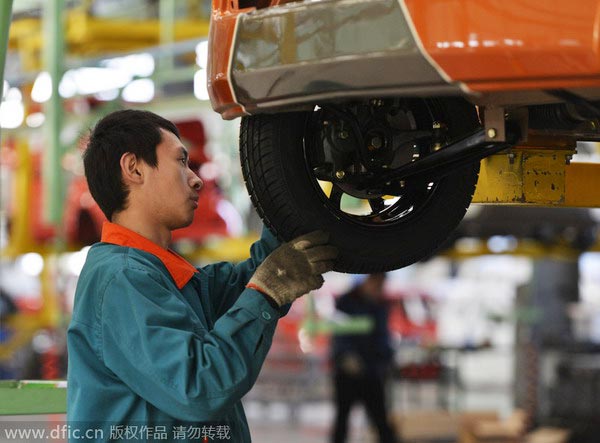 |
|
A Chinese worker assembles a new energy car on the assembly line at an auto plant in Zouping county, East China's Shandong province, Dec 16,?2014. [Photo/IC] |
Chinese manufacturing companies need to do more to integrate information technology into their production processes in order to ride the tide of smart transformation in the sector, according to a Deloitte report on Tuesday.
The report, released ahead of the annual meeting of the New Champions 2015, or the Summer Davos in Dalian, said only 42 percent of some 200 surveyed manufacturing companies have taken steps to achieve informatization, far from enough under China's "Made in China 2025" plan.
"Smart manufacturing is one of the priorities in the 2025 plan, meaning information technology will play a pivotal role in driving the success of Chinese manufacturing industry for the future," said Zhang Tianbing, partner of Deloitte China.
"To succeed, companies need to deal with the challenges in the application of information technology and this involves a 360-degree understanding of their own production processes and a detailed execution plan," he added.
Chinese manufacturers could find it hard to connect with other upstream or downstream companies for sharing and utilizing consumers, inventory, production, and other information, especially when degrees of smartization along the industry chain are different, said the report.
Other hurdles include the security of industrial data and control system, as well as the lack of a unified standard for adopting information technology.
China unveiled the first 10-year plan in March to upgrade its sagging manufacturing sector, unifying informatization and industrialization and prioritizing the development of 10 particular fields, including information technology, new materials and agricultural machinery.
According to the Deloitte report, automation equipment is being about twice more extensively used among China's manufacturing companies, especially automobile and electrical machinery ones.
"Multiple emerging technologies such as 3D printing, robotics and artificial intelligence are driving disruptive innovations and enabling new players to stake a claim in range of industrial sectors including manufacturing," said Gary Coleman, Global Industry and Senior Client Advisor for Deloitte Consulting.
Market potential is unparalleled. The report estimated China's smart home market is expected to reach 43.1 billion yuan ($6.77 billion) in size by 2015.
"China needs to strongly invest in and embrace these technologies to move from a current manufacturing giant to a global manufacturing power house," he said.
